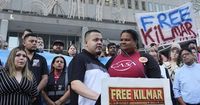On a humid Monday in Baltimore, the fate of Kilmar Abrego Garcia—a 30-year-old construction worker, husband, and father—once again became the focus of heated national debate over U.S. immigration policy. Abrego Garcia, a Salvadoran national who has lived in Maryland for years, surrendered to U.S. immigration authorities on August 25, 2025, as the Trump administration renewed its push to deport him. His case, marked by legal missteps, political rhetoric, and public protest, has become a flashpoint in President Donald Trump’s aggressive campaign to remove noncitizens from the country.
According to reporting from SWVA Today, Abrego Garcia’s attorneys swiftly filed a lawsuit upon his detention, seeking to halt his removal until a court could fully consider his claim for protection. They argued that deporting him to Uganda—where the U.S. now proposes to send him—would place him in grave danger. The legal action triggered a blanket court order that automatically paused deportation efforts for two days for immigrants in Maryland who are challenging their detention. For Abrego Garcia, the pause offered only a brief respite in a saga that has already seen him wrongfully deported, returned, and detained again.
The events of August 25 were charged with emotion. Roughly 200 supporters gathered outside the federal immigration office in Baltimore, holding signs reading “Stop Detaining Our Neighbors” and “Free Kilmar.” They prayed, chanted, and waited anxiously as Abrego Garcia, accompanied by his wife, Jennifer Vasquez Sura, and his lawyer, entered the building. Addressing the crowd before surrendering, Abrego Garcia declared through a translator, “This administration has hit us hard, but I want to tell you guys something: God is with us, and God will never leave us. God will bring justice to all the injustice we are suffering.” When his wife and attorney emerged without him, the crowd erupted in chants of “Shame!”—a raw display of community frustration and solidarity.
Behind the scenes, the legal battle was already underway. Simon Sandoval-Moshenberg, Abrego Garcia’s lead immigration attorney, outlined the immediate steps: “I expect there’s going to be a status conference very promptly, and we’re going to ask for an interim order that he not be deported, pending his due process rights to contest deportation to any particular country.” The urgency stems from the Trump administration’s determination to remove Abrego Garcia months before his scheduled trial in Tennessee, where he faces human smuggling charges stemming from a 2022 traffic stop. Federal officials allege he is a danger to the community and an MS-13 gang member—accusations he flatly denies. He has pleaded not guilty and asked a judge to dismiss the charges, describing them as retaliatory and vindictive.
Abrego Garcia’s legal odyssey has already included a wrongful deportation earlier this year. In March, he was mistakenly sent to a notorious prison in El Salvador, despite a judge’s earlier finding that he faced a “well-founded fear” of violence there. After a court order, the Trump administration brought him back to the U.S. in June, only to detain him on the new criminal charges. He was finally released from jail in Tennessee on August 22 and reunited with his family in Maryland—a brief moment of relief before the next round of legal and bureaucratic hurdles.
As the legal team fights deportation to Uganda, they have raised concerns about human rights abuses in that country and Abrego Garcia’s limited English proficiency—a daunting prospect in a nation where English is the official language. “We don’t know whether Uganda will even let him walk around freely in Kampala or whether he’ll be inside of a Ugandan jail cell, much less whether they are going to let him stay,” Sandoval-Moshenberg told reporters, highlighting the unprecedented and uncertain nature of this third-country removal attempt. Uganda has recently agreed to accept deportees from the U.S., but only if they have no criminal records and are not unaccompanied minors. For Abrego Garcia, whose legal status is still in limbo, the outcome is far from clear.
Adding another layer of complexity, Abrego Garcia’s attorneys notified Immigration and Customs Enforcement (ICE) that Costa Rica would be an acceptable country of removal. They cited assurances from Costa Rican authorities that he would be granted refugee status, allowed to live freely, and protected from re-deportation to El Salvador. Sandoval-Moshenberg described the option as “an acceptably less-bad option,” emphasizing that while Costa Rica is not justice, it offers a measure of safety lacking in either El Salvador or Uganda.
On the other side of the political divide, the Trump administration has made clear its intent to press forward. Department of Homeland Security Secretary Kristi Noem stated on X that Abrego Garcia was being processed for deportation. U.S. Attorney General Pam Bondi, in a meeting with President Trump, declared that Abrego Garcia “will no longer terrorize our country.” Justice Department spokesperson Chad Gilmartin reinforced this stance, saying, “Either way, we will hold Abrego Garcia accountable and protect the American people.” Supporters of the administration argue that Abrego Garcia’s illegal entry and the 2019 immigration judge’s ruling make him eligible for removal, regardless of the destination.
Yet, for Abrego Garcia’s advocates, the fight is about more than legal technicalities. They point to the dangers he faces if returned to El Salvador, where gangs have issued credible threats against him, and the risks inherent in being sent to a third country with no connections or support. The legal process itself is murky: if immigration officials determine that Abrego Garcia lacks a reasonable fear of being sent to Uganda, he can ask a U.S. immigration judge to review that decision. Should the judge uphold it, he can appeal to the U.S. Court of Appeals—though as Sandoval-Moshenberg notes, “We don’t even know if the government agrees with that. This is all so very new and unprecedented. ... We will see what the government’s position on that is.”
For now, Abrego Garcia’s future hangs in the balance, caught between shifting legal interpretations, political imperatives, and the unwavering support of his family and community. The next steps in his case will not only determine his fate but could set precedents for how the U.S. handles similarly complex deportation cases in the future. As the legal and political drama unfolds, one thing is certain: the story of Kilmar Abrego Garcia is far from over.



